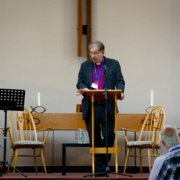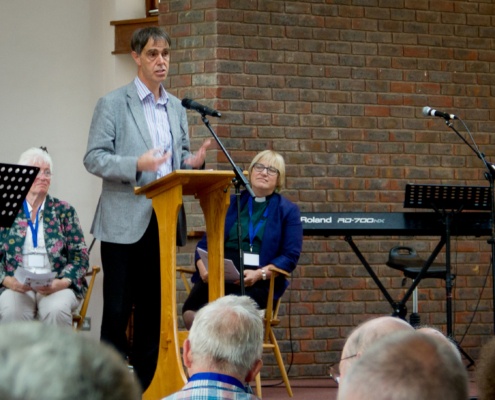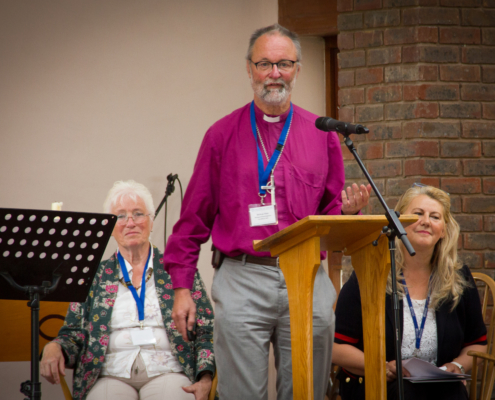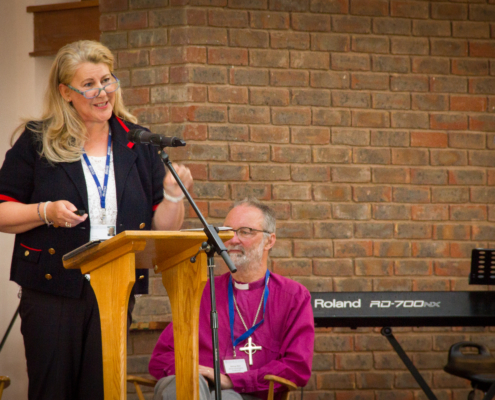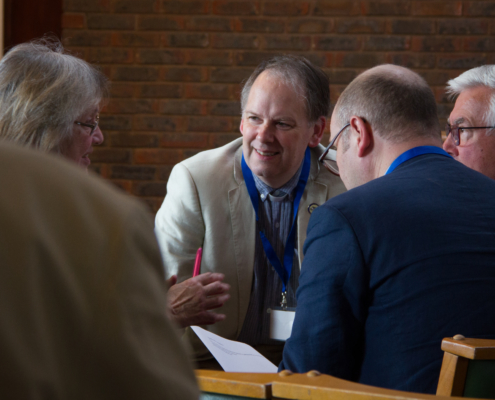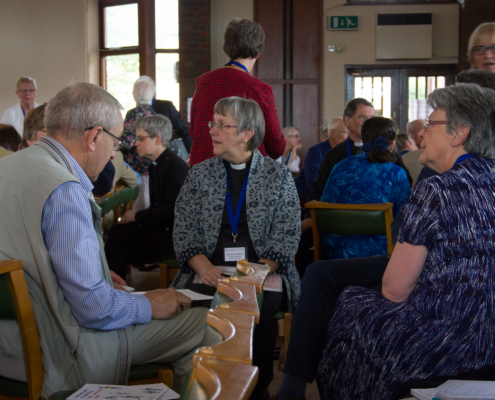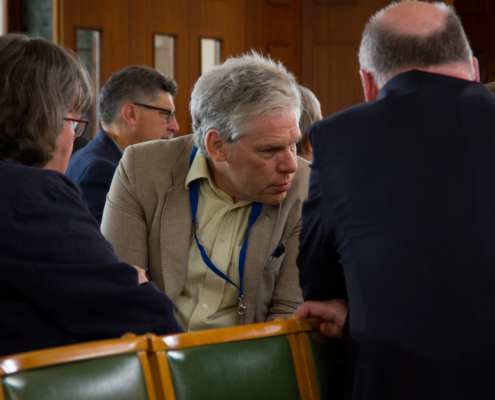Jesus entered a certain village, where a woman named Martha welcomed him into her home. She had a sister named Mary, who sat at the Lord’s feet and listened to what he was saying. But Martha was distracted by her many tasks; so she came to him and said, “Lord do you not care that my sister has left me to do all the work by myself? Tell her to help me. But the Lord answered her, “Martha, Martha, you are worried and distracted by many things; there is need of only one thing. Mary has chosen the better part, which will not be taken from her”
A recording of the following presidential address given by Bishop Steven to Oxford Diocesan Synod can also be heard here on SoundCloud.
Dear friends
Eighteen months ago I began my journey across the Diocese of Oxford as a new Bishop with L-Plates. I spent a day in every deanery. I held an open evening for each visit. More than 3,000 people came.
I learned that we are a large and diverse diocese. Together we are more than a thousand local churches, chaplaincies and schools. We serve a population of more than 2.4 million people which is set to rise sharply in the next decade. We are present in great cities and towns and villages and everything in between across Berkshire, Oxfordshire, Buckinghamshire and Milton Keynes.
As I travelled and listened, I began to ask two simple questions: What kind of church are we called to be? What are we therefore called to do together? Those are the two questions which have shaped our common vision.
The process of rediscovering that vision has been unexpected and energising for me and for many others. We have been making a journey from the place of Martha, anxious and worried about many things, to the place of Mary, understanding one thing is needed: to set Christ at the centre of our lives and of our church.
I have observed many processes of change in the Church over the years. I have learned some lessons from that journey, albeit slowly. The first and the most important is that real change and renewal always begins as together we catch a fresh vision of Jesus Christ at the centre of who we are and who we are called to be. That is true for us as individuals, for local churches and for a diocese.
Telling each other the story of our decline does not generate life and hope and change. Setting each other unrealistic targets does not generate life and hope and change. Neither does demanding more with less resources.
Calling the Church back to Jesus Christ is the only way forward. Seeing Christ afresh, returning to our source and our centre, learning to speak of the Church again, the Body of Christ, with hope and joy and love – these things give life and energy and enable change to happen well.
So I began to share a very simple vision for the life of the Church in this Diocese. It is simply that we should aim to be by the grace of God a more Christ-like Church for the sake of God’s world. I began to talk about the Beatitudes: eight qualities which together paint a picture of what it means to be like Christ and a picture of human flourishing.
We began to search for and articulate three qualities which might sum up this vision in a way that we could remember and in language that would feed the soul. We began to speak of the call on the Church in this generation to be more contemplative, more compassionate and more courageous.
There was a lot of fine tuning along the way. But those themes began to resonate. I found whenever I talked about what we should do, people listened politely and some agreed. But whenever I talked about the kind of Church we should be there was real energy in the room and deep engagement.
A year ago we gathered about 120 people from across the diocese at the High Lee conference centre for three days. We explored our two questions. What kind of Church are we called to be? What should we therefore do together? Again there was real energy around the first question: the call to be like Christ. There was much less clarity and energy around the second though we began to think about six areas for development.
I came back from High Lee thinking we had, by the grace of God found a way of expressing our common vision and it was now time to write some plans and get on with what we were going to do. But everyone I talked to said “Whoa. Just a minute. Let’s slow this down. If we are serious about exploring what it means to be a Christ-like church we need to do exactly that”.
So a year ago I asked the whole diocese to spend this year dwelling in two biblical passages: in the Beatitudes in Matthew 5; and in the Lazarus story. Over 6,000 people have engaged with the two short study booklets (available here): well over 1 in 10 of our worshipping community. Many more have shared in sermon series or home groups. Around 700 people have taken part in Area Development days and our consultation with young people. In May we explored the themes with over 320 clergy at our clergy conference in part through a third biblical passage, the Letter to the Colossians.
By the grace of God there has been a deep sense through the year of the Church across the Diocese gathering around this vision to be a more Christ-like Church for the sake of God’s world: more contemplative, more compassionate, more courageous. There has been a rich, deep sense of God refreshing us and drawing us back to Christ who is the source of our life. A journey from Martha to Mary.
A few weeks ago, I began to notice something else. There has also been an important sense that even after a year we are only just beginning to understand what it might mean to centre ourselves on Christ again. This is not what I expected to happen. I thought as I did last year that we would reach this point and get on and write some plans and put them into practice. I think we are a bit clearer on what we should do next and I will talk a little about that later in the morning. But here is the most important thing I have heard from the Diocese through this year of focussing on being a more Christ-like Church.
This call to be more Christ-like, to sit at the feet of the Lord, is not the preliminary work we need to do before we find a new strategy. It is the vision and the strategy. It is the response we are called to make. It’s not the appetiser before the main meal. It is the whole banquet. We cannot leave this behind as if we have done the work now. We are just beginning. We must go on thinking and reflecting and dwelling in Christ and growing in love for Christ and for one another and for the world and put that front and centre. This is God’s work of transformation in us, to present each of us mature and complete in Christ, knowing we are loved and called to love and we need to stay with that and work with that.
We should make plans together and we will. But as we go into the next part of the journey, the vision to be more Christ-like remains front and centre in its centrality and importance. Our plans to care better for creation, to plant churches or renew catechesis or connect more with our schools flow from that vision and a deep listening to our context. If this is the kind of Church we are to be, what does that mean in this place at this time? So those plans are important but they are not the centre of what we do. By contrast they are down here [ed: Bishop Steven reaches down when saying this]. Nurturing our vision of Christ and of being a Christ-like church is front and centre. Our plans for this year and next flow from that vision.
The same should be true at local level. They are not alternatives but we need to keep that sense of priority and blessing and all we do flowing from that central vision. It feels to me as though we as a diocese are discovering again this pearl of great price, this treasure buried in a field: learning to value the person and character of Christ and the call to be like him for the sake of God’s world.
The Beatitudes have begun to show us again the character of Christ: poor in spirit, weeping with compassion for the world, meek, taking the form of a servant, hungry and thirsty for righteousness, full of mercy, ready to be with forgotten and broken people, pure in heart and living from the inside out. They show us that Jesus is the peacemaker above all peacemakers, willing to endure suffering and death to reconcile the world to himself. They show us that Jesus is prepared to endure suffering and death and to give his life as a ransom for many.
The character of Christ is contemplative, compassionate, courageous. The nature of Christ reveals to us who God is and what God is like: good news for the world. The nature of Christ reveals to us what it means to live well in this world – what human life can and should be. We find fulfilment as we understand what it means to be contemplative, living in a rhythm of stillness and reflection as well as activity, finding peace in our maker and redeemer. We find fulfilment as we understand what it means to be compassionate: to respond to God’s love in love for others. We find fulfilment as we learn to live our lives courageously investing with hope in the kingdom of God and making a difference in every part of God’s world.
What kind of Church are we called to be? A Christ-like Church for the sake of God’s world. This is our common vision: to be contemplative, compassionate and courageous in all we are together and as we live out our calling as disciples.
As our common vision settles, we will continue and deepen in our focus. I will ask the diocese again in the coming year to continue to reflect on what it means to set Christ at the centre.
As we do that we will continue to listen to the context and where we are and to ponder what are we therefore called to do together.
We set up six groups this year to listen and reflect on strategy and to work in these six areas:
- To make a bigger difference in the world
- To share the faith and grow the local church
- To plant new churches and congregations
- To serve every school in our community
- To put the discipleship of all at the heart of our common life
- To celebrate and bless our largest, fastest growing city: Milton Keynes
The groups have been working at different rates and in different ways. They have all grounded their reflection in what it means to be a Christ-like Church. They have all listened carefully to our wider context. The Bishop’s Council is meeting together on 11th July to gather their reflections together.
We are not bringing a complete five or seven or fifteen year plan. We are not bringing a brochure with 15 bullet points under each heading. The groups have worked at different rates. They will all continue for a further period. We have established a seventh group to look again at our church-based work with children and young people.
But here is a summary of what the main proposals the groups will be bringing.
The main thing we have heard in all of our listening is that the focus of our diocesan strategy should be on the local: enabling local churches and chaplaincies and schools to be more Christ-like for the sake of God’s world. Moving forward is not about the centre telling everyone what do. It is about encouraging one another and learning from each other around common themes.
We will be therefore be commissioning a piece of work to help and support local churches as we together seek to be more Christ-like. This will draw together the best insights of Partnership for Missional Church and Mission Action Planning and provide a practical tool for deepening and developing congregational life.
We have identified the need significantly to increase our capacity to support and enable local mission and establish new congregations. Three of our archdeaconries are by far the largest in the Church of England and almost twice the size of the average archdeaconry. We will be considering and developing proposals to create three new archdeaconries across Berkshire, Buckinghamshire and Oxfordshire to better resource local mission.
Our world faces an environmental crisis – one of the great ethical dilemmas of our age. The working group focussed on making a bigger difference in the world will be bringing forward proposals on better care for the environment for next year. They will continue to work on serving the poorest communities and especially on questions of housing and on encouraging advocacy and engagement.
People understand less about the Christian faith in every generation. We will begin a major initiative on renewing catechesis across the diocese, beginning in the Oxford Area. There will be a new annual pattern, a new national digital resource which will we pioneer and five Bishop’s study days in the autumn for clergy and lay ministers. The group working on sharing our faith will continue its work learning from good practice in helping people engage with and think about Christian faith in third spaces.
Our diocese will be transformed over the next ten years through new housing and new communities. The third working group has developed a comprehensive vision for beginning new congregations. That group is encouraging us to pray and work towards 750 new congregations locally by 2030; 50 new churches of 100+ members and 6 new resourcing churches of 250+ members. It is likely that we will focus our first bid to the national strategic development fund around this part of our strategy. This growth needs to be in addition to the spiritual and numerical growth we will continue to be looking to foster in every church large and small, across the diocese.
Over 60,000 young people attend our CE schools and over 250,000 children attend community schools across the diocese. We want to love and cherish every church and community school across the diocese. Our fourth group on serving our schools has focussed on a this church-school relationship. We propose to re-imagine the Church’s relationship with both its own CE schools and develop a framework to maximise its reach into all schools. We want to empower local churches in the diocese to link with schools in new and relevant ways, which are seen as valuable, loving and serving in those communities. By 2023, we want every secondary school and child to have access to a Christian chaplaincy team. By 2027 we want to be able to evidence a reduction in mental health issues in schools with those chaplaincy teams and this reimagined relationship.
Our fifth group on discipleship has gathered wisdom from both the local context and the national Setting God’s People Free initiative (which was discussed in this Synod in March 2017). The SGPF report underlines the importance of the Church recognising and supporting the reality that our lives as disciples are mostly lived ‘out there’, not ‘in here’. Later, Olivia, Andrew and Judith will outline proposals to pilot in the coming months ways of enabling us each to develop as Christ-like Christians ‘out there’ and suggest ways in which churches can be encouraged to affirm and support this.
Our sixth group on celebrating and blessing Milton Keynes is still listening and exploring and praying through what that might mean.
Work with children and young people features in the work of all the groups. However we have identified through the year that we need a particular focus on our church-based work with children and young people and I will chair a new working group on that theme going forward.
As you will see there is a great richness and depth and texture to these proposals which have emerged from nurturing our central vision to be a more Christ-like Church for the sake of God’s world and then careful listening to where we are now. I am grateful to all who have contributed to that process so far.
The plans are important. Wise stewardship is vital. But I return to where I began…
The centre of our calling remains to become a more Christ-like Church, locally and as a diocese. That priority will be constant. Our other plans will change and evolve. They are the outworking of our common centre. Individually and together we are called to go deeper into Christ, to help the world and the Church understand that we are created in love, redeemed in love, recreated for love and in this we find our identity and our value and our place in that creation.
We are called to be contemplative, compassionate, courageous: to be a Christ-like Church for the sake of God’s world.
+Steven
Presidential address to Diocesan Synod
16 June 2018

